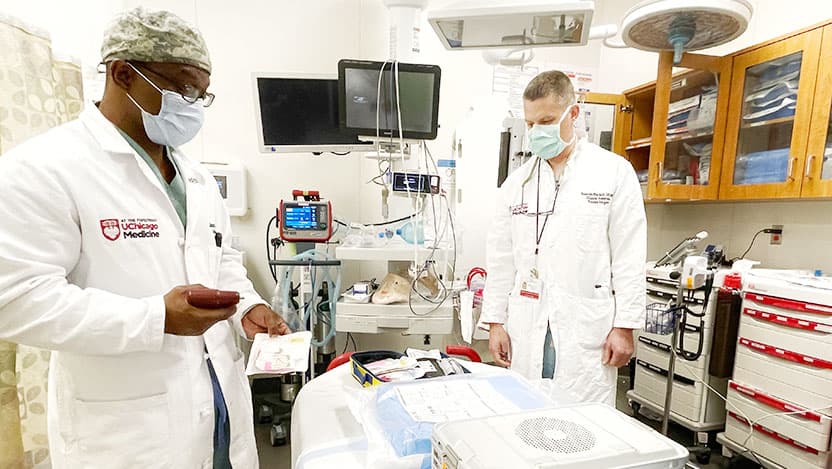U.S. Army to train military healthcare personnel at UChicago Medicine’s Level 1 trauma center

Kenneth Wilson, MD, left, medical director of UChicago Medicine’s trauma center, works with Lt. Col. Timothy Plackett, DO, a trauma surgeon from the U.S. Army who is spending the next three years working at the Hyde Park academic medical center.
The University of Chicago Medicine will become the latest premier trauma training site for U.S. Army physicians, nurses and medics ahead of their deployments in a unique partnership that seeks to share knowledge and experience.
Through the Army Medicine Department (AMEDD) Military-Civilian Trauma Team Training (AMCT3) program, Army personnel serving on Forward Resuscitative Surgical Teams (FRSTs) will train at UChicago Medicine’s South Side trauma center. Together with their civilian counterparts, the experienced teams will provide critical care and trauma treatments to patients at the academic medical center located in the Hyde Park neighborhood of Chicago.
The program provides Army medical personnel the opportunity to sharpen and maintain their clinical skills by working at leading trauma centers across the country while giving them a chance to collaborate and learn from their civilian colleagues. It also brings the military’s unparalleled medical experience to partnering trauma centers.
Army medical personnel will train at UChicago Medicine through embedded or short-term rotational assignments. Those who are embedded will live in Chicago and work as full-time staff for up to three years. Eventually, as many as 30 Army medical personnel will train in Chicago each year, including surgeons, emergency medicine physicians, emergency and critical care nurses, anesthesiologists and certified nurse anesthetists, combat medics, operating room technicians, licensed practical nurses and other surgical subspecialties.
“As an academic medical center, UChicago Medicine has long been committed to training the next generation of healthcare providers,” said Kenneth S. Polonsky, MD, Dean and Executive Vice President for Medical Affairs at the University of Chicago. “Expanding our educational mission to include Army clinicians extends and builds upon that work and, in turn, brings the military’s experience treating blunt and penetrating wounds to our hospital, which benefits our trauma care teams, the broader organization and, ultimately, our patients.”
The Army launched its AMCT3 program
The first cohort of Army clinicians — the 20-member 759th FRST— will begin arriving at UChicago Medicine from Fort Bragg in North Carolina as soon as this fall. Lt. Col. Timothy Plackett, DO, MPH, a trauma surgeon, arrived in January 2021, ahead of the team. But his connection to Chicago started long before: Plackett grew up in the suburbs, attended Midwestern University Chicago College of Osteopathic Medicine and did training rotations at South Side and south suburban hospitals, including Provident Hospital, Advocate Christ Medical Center and the now-closed Michael Reese Hospital. He joined the Army in 2003 and was eventually deployed to Iraq and Afghanistan. Before arriving at UChicago Medicine, he was commander of the 759th FRST that is joining the Medical Center. “To be back home and be able to give back to the South Side community has been really important to me,” he said. In his first few months, Plackett has already performed about 50% more surgeries than he would have as an active-duty surgeon at a military hospital and cared for a wider variety of patients with different types of injuries and illnesses. He is also forging new relationships across the medical campus and the University of Chicago, where he’s already involved in several basic-science research projects. “We’re learning best practices from one another and using what’s been learned in Iraq and Afghanistan to directly change the care we're providing on the South Side,” he said. “And the care we’ll be providing on the South Side will directly change the care we’ll be able to provide when our team is deployed.” UChicago Medicine’s comprehensive trauma program cared for about 4,400 adult and pediatric patients in 2020, a 47% increase from the previous year. The majority of those patients — about 3,800 — were cared for in the adult trauma center, which will mark its three-year anniversary May 1. About 57% of the adult trauma patients had blunt trauma injuries from incidents such as car accidents and falls. An additional 41% had penetrating trauma wounds, often from shootings or stabbings, and 2% had other types of injuries, such as burns. A case mix that includes everything from intentional violence to farm accidents makes UChicago Medicine an ideal training facility to ensure Army teams keep their skills fresh in a number of areas. Kenneth L. Wilson, MD, medical director of UChicago Medicine’s trauma center, is also a military surgeon in the U.S. Army Reserves and was a driving force behind the new Army-UChicago Medicine partnership. After multiple deployments to Iraq and Afghanistan as well as his previous work at major U.S. trauma centers, Wilson recognizes the importance of this type of trauma training. “When you’re on a military installation as a member of a medical team, you’re not doing a lot of trauma care every day. Military hospitals mainly provide healthcare services to a young healthy population, so there are rarely the types of injuries you’d see in a busy civilian trauma center that regularly treats people who’ve been in high-speed crashes or drive-by shootings. So, it can be a steep learning curve to go from that kind of environment to someplace like Syria,” Wilson said. “Hospitals like UChicago Medicine provide an ideal middle ground that lets the team train together, build their trauma ‘muscle memory’ and keep their skills fresh. So, they’ll be able to take the skills they learned here, get on a plane for deployment and immediately be able to save lives out there.”Exchanging Best Practices
An 'Ideal' Training Environment
